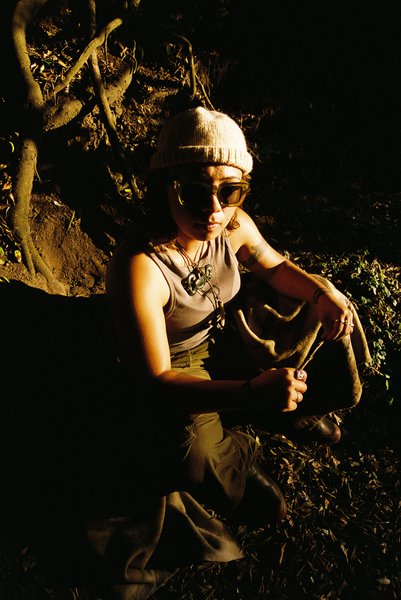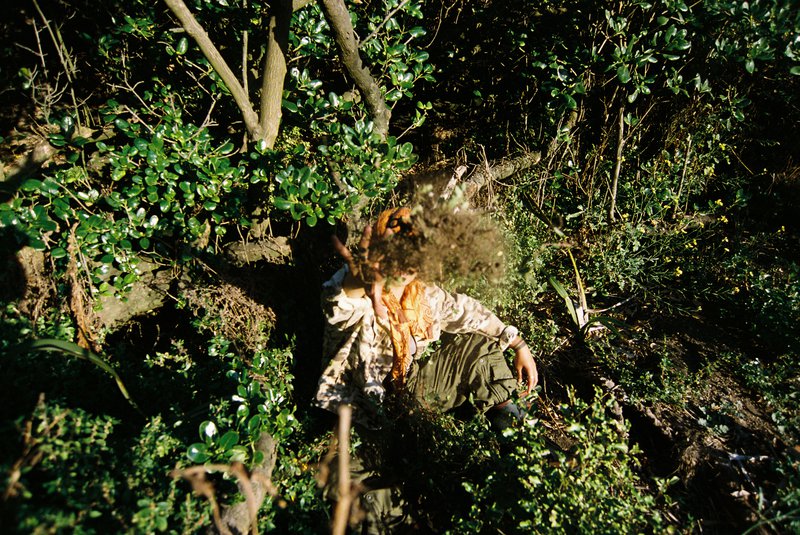23 April 2025
2024 Wellington Jazz Festival Commissioned Artist MĀ (Maarire Brunning-Kouka) has just released her sophomore album Blame it on the Weather.
From her debut album Breakfast with Hades, a self-produced solo project created from her bedroom, Blame it on the Weather marks an artistic shift - a move outwards, crafting a sound shaped by community and a desire to make music that reflects the now.
We sat down and had a chat with her to discuss the magic behind the music.
 Photo by Nicola Sandford
Photo by Nicola Sandford
"I’m a big believer that everything is always going to be a draft or demo. I want to release things once I feel safe and everyone involved feels safe in the songs.”
At the heart of MĀ (Maarire Brunning-Kouka)’s sophomore album Blame it on the Weather, is a sense of safety – built from trust, collaboration, and connection – to whenua and whakapapa. From these foundations comes a sonic landscape that feels alive: lush, ambient, grounded in hip hop, and rooted in te ao Māori and te taiao. It’s a melting pot of RnB, jazz and soul, with carefully written, poetic worlds that hold space for truth-telling, grief, care, and restoration.
From her debut album Breakfast with Hades, a self-produced solo project created from her bedroom, Blame it on the Weather marks an artistic shift - a move outwards, crafting a sound shaped by community and a desire to make music that reflects the now.
The daughter of two of Aotearoa’s most preeminent artists - Nancy Brunning and Hone Kouka - there was never any doubt that Maarire Brunning-Kouka would inherit a certain creative energy. But what she’s done with her music is something wholly her own. With the release of the sophomore album Blame it on the Weather, we sat down and had a chat with her to discuss the magic behind music.
Of Ngāti Porou, Ngāti Kahungunu, Ngāti Raukawa and Tūhoe descent, Maarire spent her upbringing based mostly in Te Whanganui-a-Tara, with stints in Kāpiti Coast, Nelson and Ōtaki.
Coming from an artistic lineage, after school care was often spent in rehearsal rooms surrounded by colourful theatre kids. “I guess my worldview was different in a lot of ways. My parents would turn up to school pick-up fresh out of a rehearsal, still with makeup on from a show they’d just performed.”
She spoke about the most recent return of Witi’s Wāhine that featured in the 2024 Aotearoa New Zealand Festival of the Arts. Written by Nancy Brunning, it was the last thing she worked on before passing away in 2019. “I’ve watched every iteration of Witi’s Wāhine. It was a triggering time actually, mum tried to direct it when she was bedridden, so every time the show comes up I think… here we go again. But it’s beautiful, it was worth it. And it was her last hurrah, so it was meant to be like that.”
Maarire’s parents also gave her a grounded perspective on what it means to work hard - and survive - in the arts. Her father, Hone Kouka (playwright, co-founder of Kia Mau festival and one of the Festival’s most-programmed artists), has built a business and bought a home off the back of his creative mahi. “Usually art doesn’t bring much money and security, but I’ve been fortunate enough to see that it is possible.”
Through her involvement in ORO MĀIA – a commissioned work at the 2024 Wellington Jazz Festival, Maarire found herself learning how to be a leader in new musical art spaces. Coinciding with the final push of her sophomore album Blame it on the Weather, she spoke about the pressure of the project, toughening her up and giving her strength for other work. “I learnt heaps from ORO MĀIA, - new ways to show art and share it. Realistically we had two days to put everything together… there’s a lot that comes with being a quick creative, being intentional and making sure the words felt supported by the music.
“Eventually I’d love to incorporate theatre into my shows - like a full production. My first album release for Breakfast with Hades, was kind of like that. I had dancers, because I didn’t want to perform all of my songs - it felt like a little cheat code! With this new album… I would’ve loved to tour it in the bush, but my manager was like - you’re funny. It’s super expensive to try and rig a bunch of trees with speakers and things.”
A celebration of the Pōneke community, she reflects on her love for early Fat Freddy’s Drop and Trinity Roots, where you can hear Wellington through the music. “I really want to be that person. I’m a big lover of this city and what it offers and how it takes care of everyone. I want to make music that captures what’s happening right now.”
Featuring collaborators including Mato Wayuhi (Oglala Lakota), Romi Wrights, Jordyn With a Why, MAJIC, Iris Little, LILA, Leonardo Coghini and DJ WYNONA and brought to life on stage by her band, The Fly Hunnies - Louisa Williamson, Maioha Hotere, Hikurangi Schaverien Kaa, Ensai August, Jason Rapana, Leonardo Coghini and Hayden Afele-Nickel. Blame it on the Weather “became a timestamp for what’s happening right now… we have a lot of care and a lot of respect towards each other's art, so of course I want to work with that.”
Opening with Decayfeaturing a powerful collaboration with Oglala Lakota artist Mato Wayuhi, the track lays the groundwork for the album’s kaupapa: “How will my koros get away? / How will my babies get away?” Asking us to consider what we leave behind for our mokopuna and future generations.
Puha me te Porohewa, created in collaboration with matanga reo Hana Mereraiha as part of a Waiata Anthems initiative, takes traditional narratives of cannibalism and recenters them to critique the current government and colonial systems.
Miss You featuring Romi Wrights, holds space for loss and suicide, flipping personal grief into collective uplifting. The end of the song transformed with communal singing, and dance, connects audiences together in cathartic release when played live.
Tīhei breathes life and protest into heavy times, the beautiful harmonies standing as a mihi to Palestine and a reminder of our shared humanity.
In Hoki Atu Mate the attention is turned to ‘pest plants’, reframing their presence on the whenua “Every weed we have in Aotearoa was brought here…Everything in moderation, everything has a place,” offering a reminder that restoration begins with understanding.
Tipi Haere, inspired by long walks through Porirua bush that end at the landfill, transports us into lush ambient textures and field recordings of birdsong to reflect on consumption and our lack of understanding with what we do with waste. The name refers to going for a wander, or walk, and is reflected musically in the song.
Papas Song, featuring vocals by Iris Little and keys from Leonardo Coghini (who also co-produced Māhi, Traps Jam, Decay and Tīhei), is a soulful standout that contrasts and flows beautifully within the work as a whole.
Traps Jam brings us into the room where it happened - built from a voice memo that captured the song’s creation. “We had four versions of it that we worked on and nothing was sticking. I was like - I love this voice memo of us writing it. I’m gonna put it in the album.”
Closing with Kia Ū - a call for rapid transformation, which grounds the album’s message of urgency, intention, and aroha.
The album is balanced like an ecosystem - layered, textured, and deeply alive. Built and inspired by the people who shaped it. “I wanted it to sound like the environment, like wood, rustling leaves, hardship in the sounds. Vocally, my own karanga embodying te pou, birds.” A documentation of connection, shaped by community. Blame it on the Weather showcases the sound of an artist growing into their power while staying grounded in where she comes from.

Photo by Nicola Sandford
Now touring the album with her band, MĀ and The Fly Hunnies, tickets are still available for the final show in Te Whanganui-a-Tara on 26 April. You can buy tickets for the show here.
Blame it on the Weather is available to stream now on Bandcamp, Spotify, and all major platforms.
ARTicle written by Hannah Flacks
Disclaimer: ARTicle includes a variety of content, including interviews, editorial commentary and links to external sources. The views expressed by interviewees, editors and external sources are their own and do not necessarily reflect those of Tāwhiri, its team, or its partners.


